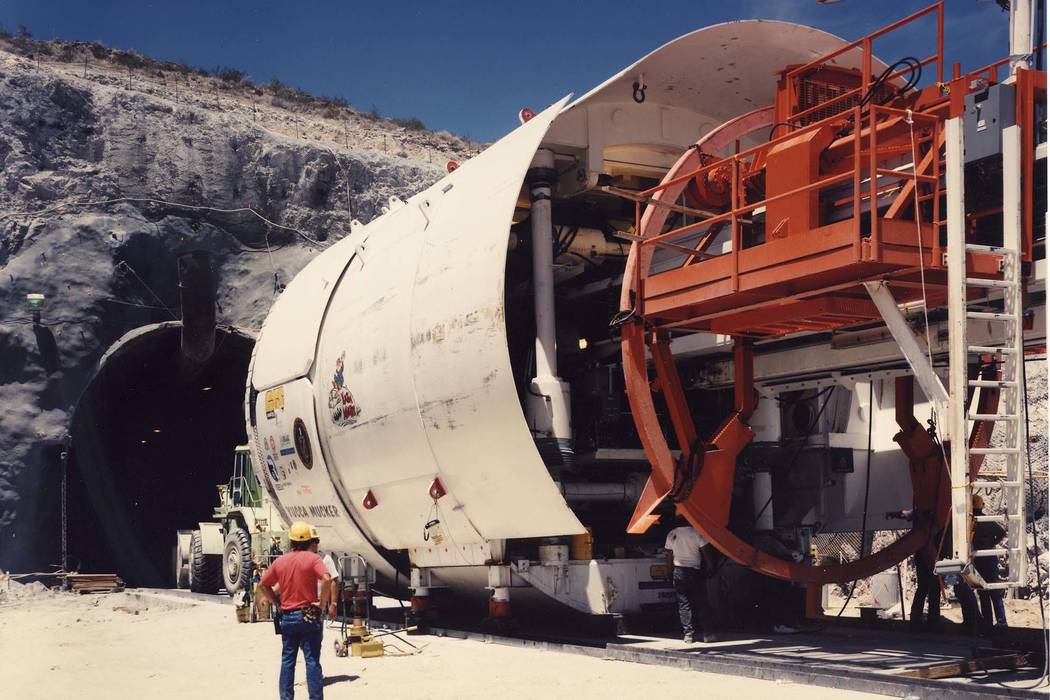Nevada asks to intervene in Texas lawsuit over Yucca Mountain
Nevada sought to intervene late Wednesday in a Texas lawsuit that seeks to force the federal government to restart the dormant Yucca Mountain nuclear waste storage project.
Court papers filed by Nevada Attorney General Adam Laxalt asked the 5th Circuit Court of Appeals in New Orleans to approve the state as a party in the case. The lawsuit filed by Texas last month “directly — and adversely —threatens the rights of Nevada and its citizens,” the filing said.
The 20-page motion to intervene as a respondent in the Texas lawsuit against the U.S. Department of Energy asserts that Nevada faces a serious threat “from the intense negative perception and stigma associated with transportation to Nevada and disposal of high-level radioactive waste and spent nuclear fuel in Nevada.”
‘Perceived risks and stigma impact’
“These perceived risks and stigma impact could lead to losses of jobs, losses of property values, and losses of tax revenues,” the motion reads, citing an affidavit from Nevada Agency for Nuclear Projects Executive Director Robert Halstead.
Transporting spent fuel assemblies from nuclear power reactors and disposing them in a maze of tunnels inside Yucca Mountain also “would inevitably lead to increased radiation doses to Nevada citizens and to the contamination of lands and groundwater,” according to Halstead.
“Nevada’s sovereign interests are injured, because under Nevada law, all groundwater is owned by the people of Nevada and administered by the State of Nevada,” Halstead wrote.
He added that if Texas prevails, the lawsuit will “short-circuit the legislative process currently pending in Congress, hamper Nevada’s ability to present its case at the licensing hearing and rush a flawed project to completion at the direct expense of Nevada’s sovereign interests and the health, safety, and welfare of its citizens.”
Yucca Mountain, a volcanic-rock ridge in Nye County, 100 miles northwest of Las Vegas, is the only site federal scientists have studied in-depth for burying the estimated 77,000 tons of used nuclear fuel assemblies piling up at nuclear power plants around the nation. The Nuclear Regulatory Commission temporarily suspended the licensing process in October 2011 when Congress eliminated funds for it during the Obama administration.
Suit seeks to force NRC vote
Texas Attorney General Ken Paxton’s lawsuit seeks to compel the NRC to make an up-or-down vote on constructing the permanent repository for highly radioactive waste at Yucca Mountain, maintaining that the 2012 deadline for a decision was ignored by the federal government. This caused “potential dangerous risks from radioactive waste” stored at commercial nuclear power sites across the nation, it said.
A spokeswoman for Paxton declined to comment on the Nevada filing Thursday, citing policy on pending litigation.
The spokeswoman said the federal government still must respond to the Texas lawsuit by May 30.
Nevada officials, who are united in opposition to the project, used the occasion of the filing to again make their case against allowing it to move forward.
In a statement Thursday, Nevada Gov. Brian Sandoval said, “Science has confirmed that Yucca Mountain is incapable of safe storage of the world’s most-toxic substance.
“The State of Nevada is prepared to successfully defeat this dangerous and ill-conceived project at every opportunity and in any venue. Texas’s petition would drastically diminish Nevada’s ability to present its case against Yucca Mountain by recklessly pushing forward with a fundamentally flawed project at the direct expense of the health and safety of our citizens.”
Sen. Catherine Cortez Masto, D-Nev., called the dormant project “nothing more than a hole in the ground,” and said that “any attempt to discuss the opening or licensing of a nuclear repository site must include the state and key stakeholders.”
Her Republican counterpart, Sen. Dean Heller, asked the Senate Appropriations Committee to abandon efforts to revive Yucca Mountain and instead focus on programs that would provide sustainable long-term strategies to address the nuclear waste problem.
Rep. Dina Titus, D-Nev., called the project a “boondoggle” and said that “any attempt to spend billions more on this disastrous plan is bad science and wasted resources.”
Review-Journal staff writer Gary Martin contributed to this story. Contact Keith Rogers at krogers@reviewjournal.com or 702-383-0308. Follow @KeithRogers2 on Twitter.
Resuming Yucca Mountain licensing
Here is what would happen if courts order the licensing process to resume:
• Congress must appropriate funds for NRC and DOE licensing activities, estimated at $330 million just for the NRC.
• NRC vote to lift suspension of licensing process imposed in September 2011.
• An NRC branch must appoint one or more Atomic Safety and Licensing Boards or Construction Authorization Boards, usually a three-judge panel.
• A case management conference, where parties resolve outstanding legal issues left from 2011, and agree to a schedule and deadlines for new contentions.
• Discovery: Expert witnesses provide depositions.
• Hearings before the licensing board could take 650 days to resolve 250 contentions.
• The board grants or denies a construction authorization.
• NRC would vote to accept or overturn the decision, also known as a "final agency action."
• Commission's decision can be appealed to the U.S. Circuit Court of Appeals for the District of Columbia Circuit, and could be appealed to the Supreme Court.
• Another round of NRC deliberations would be required before DOE would be authorized to receive spent nuclear fuel and high-level waste if construction of a repository proceeds.
Source: Nevada Agency for Nuclear Projects


































